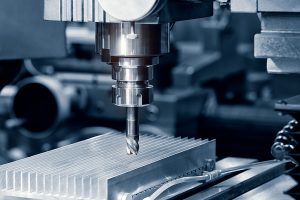Quality Control in Precision Machining
Dec 27, 2021
Whether for manufacturing applications in aerospace, medical, specialty electronics, automotive, defense, or any other industry, using quality components is critical. Modern manufacturing technologies, such as CNC machines, make it possible to produce a high-volume of parts to precise specifications. However, using the latest technologies isn’t enough to ensure defect-free production. Producing consistently exceptional components also requires a robust quality control system.
What is Quality Control & Why is it Important?
Quality control is any set of procedures designed to ensure consistent product quality and can also include plans for improvements in efficiency and production capabilities. Quality control systems are integral to any business that provides a product, whether physical or otherwise. In precision machining, quality control encompasses considerations around the manufacturing process for a specific part, equipment maintenance, inspection of components, and much more. These processes are particularly important in precision manufacturing, as they:
- Prevent defects – Defective parts can have potentially catastrophic consequences for the ultimate manufacturing application. Therefore, preventing defects and weaknesses is a critical part of any quality assurance program.
- Ensure dimensional accuracy – Many applications require parts with extremely tight tolerances with complex geometries. Without proper quality control, it will be impossible to produce components to such precise dimensions.
- Improve efficiency – A robust quality control program will consider the entire manufacturing process with the goal of producing precision components without defects in a timely manner while minimizing waste. This helps to conserve resources and control costs for customers.
For precision machining, creating an effective quality control system starts with establishing a standard for each specific manufacturing process. Only with a well-defined standard can quality assurance processes ranging from equipment setups to inspections be designed with the correct specifications.
Finding a Company That Machines Top-Quality Components
There are a variety of factors, including costs and timelines, to consider when selecting a precision machining company for your project. However, quality should always take precedence. When selecting a company, consider:
Quality Control
Before partnering with any precision machining company, ask about their quality control program. While there is no single standard to ensure effective quality assurance, their procedures should encompass a customized setup for each manufacturing process as well as comprehensive monitoring, measuring, and inspections at every phase of production.
Reputation
The best indicator of future quality is past performance. Search for precision machining companies that have a reputation for providing consistent quality in applications similar to yours.
Certifications
Certifications, such as those provided by the ISO (International Organization for Standardization), can serve as strong indicators that a precision machining company has an effective quality control system in place.
Demmer Manufacturing’s Proven Commitment to Quality
At Demmer Manufacturing, our precision machining portfolio includes companies that specialize in everything from CNC machining to metal stamping for applications in aerospace, defense, specialty electronics, and many other industries. All of our affiliates have rigorous quality control programs in place to ensure unparalleled quality, efficiency, and continuity of supply for clients around the globe. To learn more about these company’s capabilities and specific quality control systems, review our portfolio.

